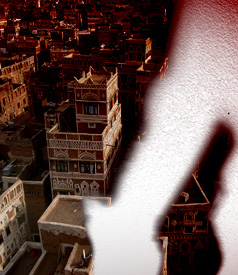From a Yemeni perspective, it appears that the West is sending terrorists to Yemen. This week, Sharif Mobley, a 26-year-old from Buena, New Jersey has joined the list of suspected Al Qaeda militants, believed to be bred in the West, and trained in Yemen.
As this list grows larger, it also appears to grow less random. Anwar al-Awlaki, a radical U.S.-born Yemeni cleric, who preaches jihad on the internet is believed to be connected to Mobley.
Al-Awlaki is already accused of encouraging the failed Christmas bomber, Umar Farouk Abdulmutallab, and of inspiring the Fort Hood massacre, which left 13 people in Texas dead. On his blog, al-Awlaki called the alleged shooter, Nidal Hasan, a “hero.”
Mobley has been in Yemeni custody for months, but it wasn’t until he tried to escape by shooting his way out of a Sana’a hospital early this week, that his status as a former nuclear power plant worker, and a currently-suspected Al Qaeda operative became public. The failed escape attempt left one guard dead and another severely injured.
Nate Harper, an American language student, was working at a nearby library when Mobley allegedly opened fire. Harper said he heard about 20 shots.
“I was here when the embassy was attacked,” he said, referring to the 2008 attack on the U.S. Embassy in Yemen that killed 19 people. “I was looking for smoke rising because if it was a car bomb or something like that then maybe it would have explained the large noises.”
According to local reports, Mobley convinced the guards to unshackle him for prayers and then stole the gun while a guard was is in the bathroom. After shooting the guards in his room, Mobley made a run for it, but was caught by hospital staff members.
The Yemeni government originally said Mobley was a German-Somali, accused of plotting terror attacks with Al Qaeda. An investigation in the U.S. found him to be an American, of Somali descent. Friends and family have been defending him in the U.S. press this week. Charles Mobley, his father, told reporters: “I can tell you this: He’s no terrorist.”
Before coming to Yemen, supposedly to study Arabic and Islam, Mobley worked for several different American nuclear power companies as a laborer. The FBI is currently looking to find out if he had access to sensitive information, which he could have passed on to terrorists. In his six years at the East Coast plants, he mostly hauled materials, and set up scaffolding, according to the Associated Press, and passed numerous security screenings.
Yemen has made high-profile efforts to combat terrorism in recent months, but many say the country, largely governed by tribal sheiks with a complex web of loyalties, not the central government, is ill-equipped to fight Al Qaeda. The central government also draws vast sums of international aid, and support in the name of fighting Al Qaeda. In front of Western journalists, government officials insist that crushing terrorism in Yemen is their first priority. But they are also not shy about admitting that they consider the recently-quiet northern rebels, “terrorist gangs.” In the past few weeks, the Yemeni government has also accused southern separatists of siding with Al Qaeda, even as separatist protesters wave British and American flags.
Join us in defending the truth before it’s too late
The future of independent journalism is uncertain, and the consequences of losing it are too grave to ignore. We have hours left to raise the $12,0000 still needed to ensure Truthout remains safe, strong, and free. Every dollar raised goes directly toward the costs of producing news you can trust.
Please give what you can — because by supporting us with a tax-deductible donation, you’re not just preserving a source of news, you’re helping to safeguard what’s left of our democracy.
